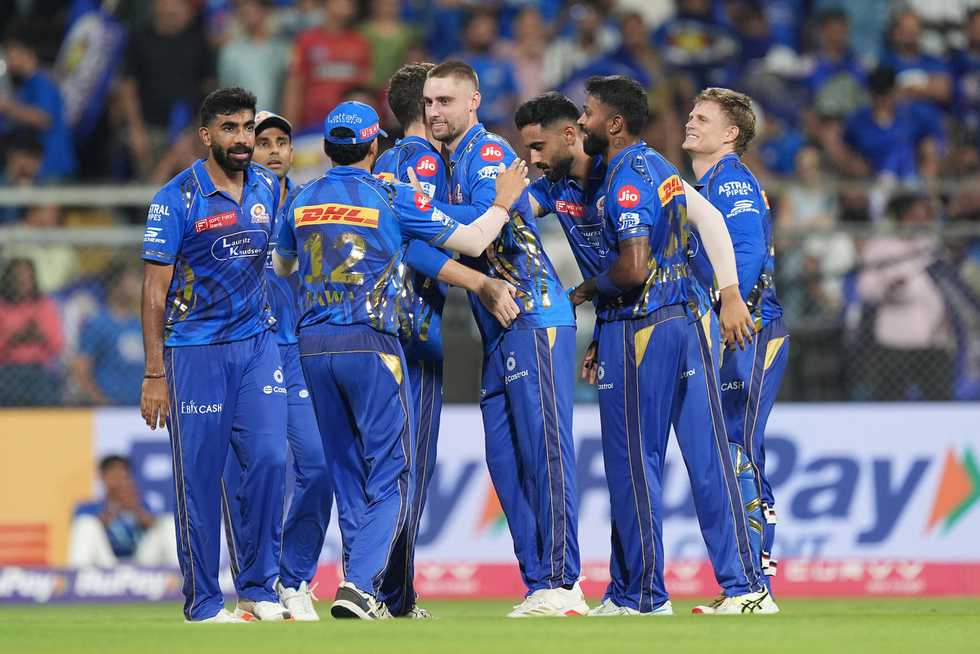

The pre-match projection was 300 but it soon fizzled out, turning out to be a false prophecy. After the first over, that figure seemed wildly unrealistic - a bit of fantasy, in fact. A total of 220-230 appeared as a more attainable total. But as the innings wore on, it felt even 175 would be a commendable achievement.
In the end, SunRisers Hyderabad limped to 162 for five - a total that once seemed like a distant mirage. If not for two late surges in the 18th and 20th overs, which cumulatively yielded 43 runs, they might have struggled to even touch 150. The home side successfully managed to choke the free-flowing SRH batsmen.
Here was a side that chased down 245 in the 19th over in the previous game. In their season-opener versus Rajasthan Royals, they had threatened to breach the 300-mark before settling for 286. If they struggled to reach 150, it was because Mumbai Indians knew it was not easy to outbat Abhishek Sharma & Co. So, they smartly laid a well-caliberated trap to stifle SRH's free-scoring batsmen.
"It wasn't the easiest wicket. (A) few runs short, we would have liked some more (runs) with the bat. When you come here you expect it to be really fluent and fast, just wasn't that. They bowled really well, shut down a lot of our hitting areas. I thought we had all our bases covered, with 160 you feel like you are a little bit short," SRH skipper Pat Cummins said, admitting that the visitors had expected something else from the wicket.
The Wankhede, historically, is one of the most batsman-friendly venues in the IPL. Uncharacteristically, it did not allow for stroke play on the night. There was moisture beneath the red soil pitch, prompting the ball to grip and turn. It didn't come on to the bat quickly enough, making strokeplay difficult. The slower deliveries, in particular, were even harder to put away. Travis Head realised this hard way.
One of the most explosive batters in the IPL, boasting a career strike rate of over 172, he found himself completely shackled by the MI bowlers. They tied him down with clever change in pace, forcing him into a shell. He crawled to 28 off 29 balls at a frustratingly slow strike rate just over 96 - his slowest in any T20 innings of more than 20 deliveries. It was also the second-slowest innings (of a minimum 25 deliveries) of the season. Even a reprieve - a dismissal overturned due to a no-ball - couldn't help him shift gears.
"It was a difficult surface and Mumbai read the conditions exceptionally well, and after probably the first few overs, they really relied on that slower ball. The slower ball is obviously effective, but it's mainly effective because of their execution, and there's some supreme exponents of it in (Jasprit) Bumrah, Trent Boult and even Hardik Pandya. So I think the way that they bowled, particularly through those middle stages, really stifled us," Daniel Vettori, SRH coach, said.
MI bowled 30 slower deliveries, conceding just 30 runs and picking up one wicket. In contrast, SRH bowled three more slower balls but ended up conceding twice as many runs. They managed three wickets off those slower ones but MI batters were too strong on the night.
"We stuck to simple basic plans. Credit to the bowlers for sticking to that (plans). We were kind of squeezing them. After the first couple of overs that Deepak bowled, a couple of balls got stuck and we realized that maybe a change of pace will be useful on this wicket," MI skipper Hardik Pandya said.
In addition to their well-disguised slower balls, the MI bowlers delivered some crushing yorkers. But the real game-changer was the off-spin of Will Jacks. The English all-rounder was smartly deployed by Pandya against the SRH left-handers. He bowled three tight overs, conceding just 14 runs and picking up two key wickets.
"We know Sunrisers are incredibly explosive. When they're on a good wicket they're very tricky to bowl to. We saw how good they were last week obviously," Jacks said. "It was not what we've seen in the past here, but it was definitely still a good wicket. We felt when there was pace on the ball we thought we could play our shots freely as long as we weren't trying to over-hit the ball."
Abhishek Sharma gave SRH a strong start but there was not much support for him at the other end. Nitish Reddy and Heinrich Klaasen tried to build the innings but acceleration was not easy for them. Klaasen took Deepak Chahar to the cleaners in the 18th over (21 runs). Later Aniket Varma did the same to Pandya in the 20th over (22 runs) but SRH are known for producing more high-yielding overs than just two.
When Mumbai Indians came out to bat, the moisture had dried up, and scoring had become a much easier proposition. While the pitch may not have been ideal for a Twenty20 contest, it suited the Mumbai Indians' plans perfectly - especially against a batting-heavy opposition. The conditions played right into their plans. The home advantage, an entitled privilege, was fully capitalised on. After their comfortable four-wicket win - second on the trot and third overall - the Mumbai Indians campaign, it seems, is back on the track.
| Share | Tweet |





